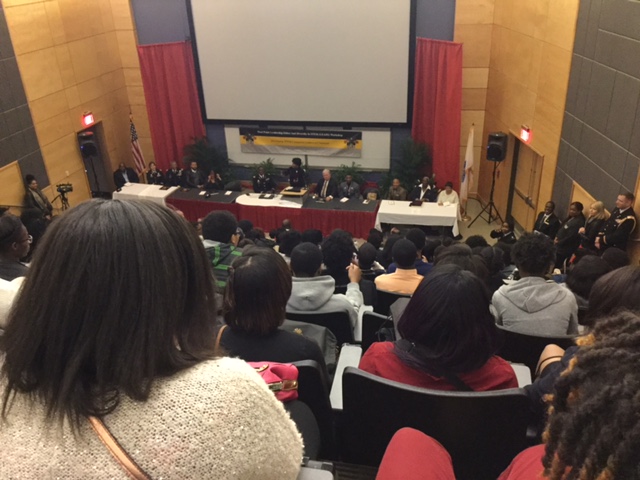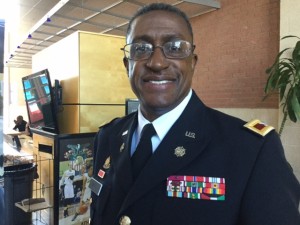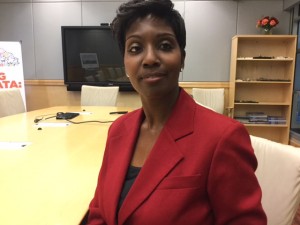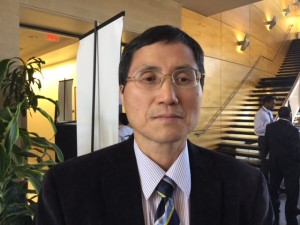
![]() Jackson Mayor Tony Yarber and former Mississippi Gov. Haley Barbour were among luminaries welcoming cadets last week from the U.S. Military Academy at West Point to Jackson State University to tout leadership and ethics to visiting JROTC students from Jackson Public Schools.
Jackson Mayor Tony Yarber and former Mississippi Gov. Haley Barbour were among luminaries welcoming cadets last week from the U.S. Military Academy at West Point to Jackson State University to tout leadership and ethics to visiting JROTC students from Jackson Public Schools.
To further emphasize how the military can lead to success, West Point paraded out its top scholar, Cadet E.J. Coleman III, who delivered the keynote address in the JSU engineering building. Coleman, the fourth African-American to be named first captain, holds the highest position in the West Point cadet chain of command. His duties as brigade commander are similar to that of a student body president.
Meanwhile, the director of the Army JROTC for the local school district is being saluted for initiating the collaboration between West Point, JSU and JPS.

U.S. Army Col. (Ret.) Paul Willis said he learned through a counterpart in Atlanta about West Point’s diversity and outreach program, which places “good role models and mentors in front of high school students to teach them important values such as ethics, decision-making and leadership.”
JSU President Carolyn W. Meyers hailed the moment with West Point as a demonstration that will “make this world a better place.”
Meyers said, “We depend on the military to keep us safe all over the world. We want the smartest, most alert people.” She urged visiting JPS students to “work hard and learn all you can because leadership is not easy.”
To earn a visit from West Point, school districts in major cities must partner with a local university, and the military academy provides training to university cadets to serve as facilitators. Fortunately, JPS already has a relationship with Jackson State because the local school district’s JROTC students attend a summer program on JSU’s campus for exposure to STEM (science, technology, engineering and mathematics).

Dr. Shonda Allen, associate director of the Interdisplinary Nanotoxicity Center at JSU, assisted Willis in facilitating the union between West Point and JSU
“The JSU and JPS collaboration already bridges a wonderful relationship between young students and exposes them to core basic science areas such as chemistry, biology, physics and environmental engineering. Now, we are exposing them to the West Point Military Academy to produce a beautiful, linear relationship with local and national officials in STEM,” Allen said.
The science and technical components are vital for developing a diverse workforce, said Dr. Hongtao Yu, a professor and chair of the JSU Department of Chemistry and Biochemistry.
“African-Americans are severely underrepresented in the acquisition of bachelor’s, master’s and Ph.D. degrees in STEM at only 5 percent, even though their national population is about 13.5 percent overall,” he said.

Meanwhile, Willis said, “What we try to do with all high school students is to motivate them to become better citizens. Leadership and character development are what we’re all about.” He’s optimistic that the relationship with West Point will enhance these characteristics further.
Echoing the significance of the relationship among the three institutions, Barbour said, “It is fitting and proper that we are here to talk about ethics and responsibility. … We’ve been blessed with a military that we can be proud of.”
He told young participants that leadership lessons learned in the military and ROTC will serve them well, helping them become the kind of leaders that the community, state and country needs. “The first function of government is security. Without this, we can’t have our freedoms, the society we enjoy or the rule of law.”
In his keynote address, Coleman said, “By going through the academy, leadership becomes part of who you are. … I think about it all the time in everything I do. Watching and understanding people are the most essential parts of leadership because you must be able to interact with other people by taking interest in them, caring for them and figuring out what drives and motivates them.” In addition, he defined leadership as “the ability to influence others in a positive manner to achieve goals and improve themselves and their organizations.”
Also, JPS superintendent Dr. Cedric Gray urged students to know their purpose.
“God wants you to be where you want to be. He wants you to be the head and not the tail, the top and not the bottom, above and not beneath. … The future is no longer tomorrow. It is right now. Embrace your place. … I need you to be successful in your space,” he said.
Yarber, too, trumpeted the attributes of leadership, labeling it as “more than a notion” and informing students about how “leadership calls you out of your passion. You’re only as great as the challenges you overcome,” he said.
In general, Willis said the partnership established between JSU, JPS and the U.S. Military Academy at West Point is a linchpin for producing better citizens because “the challenges we face are more than what we can handle ourselves. … No one can do everything, but everyone can do something. If everyone does his part, and we work together we can lift ourselves where we want to be. All it takes is a spirit of cooperation, and Jackson State has absolutely shown that.”
————————
(On Facebook: Follow Jackson State University ROTC)






